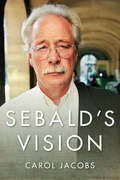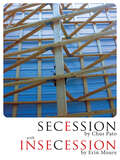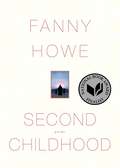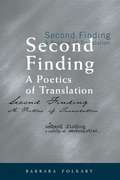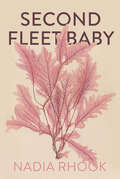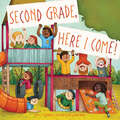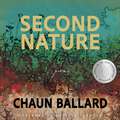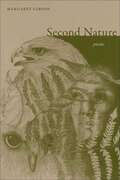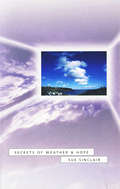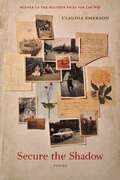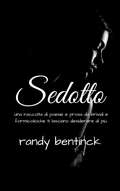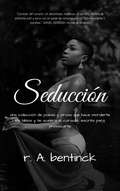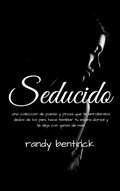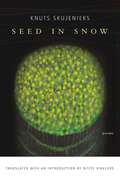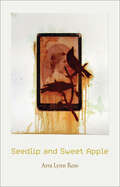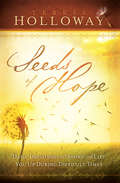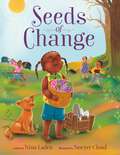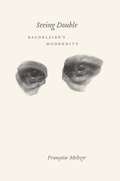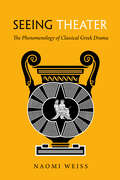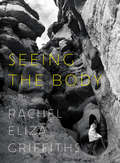- Table View
- List View
Sebald's Vision (Literature Now)
by Carol JacobsW. G. Sebald's writing has been widely recognized for its intense, nuanced engagement with the Holocaust, the Allied bombing of Germany in WWII, and other episodes of violence throughout history. Through his inventive use of narrative form and juxtaposition of image and text, Sebald's work has offered readers new ways to think about remembering and representing trauma.In Sebald's Vision, Carol Jacobs examines the author's prose, novels, and poems, illuminating the ethical and aesthetic questions that shaped his remarkable oeuvre. Through the trope of "vision," Jacobs explores aspects of Sebald's writing and the way the author's indirect depiction of events highlights the ethical imperative of representing history while at the same time calling into question the possibility of such representation. Jacobs's lucid readings of Sebald's work also consider his famous juxtaposition of images and use of citations to explain his interest in the vagaries of perception. Isolating different ideas of vision in some of his most noted works, including Rings of Saturn, Austerlitz, and After Nature, as well as in Sebald's interviews, poetry, art criticism, and his lecture Air War and Literature, Jacobs introduces new perspectives for understanding the distinctiveness of Sebald's work and its profound moral implications.
Secession/Insecession (Literature in Translation Series)
by Erín Moure Chus PatoSecession/Insecession is a homage to the acts of reading, writing and translating poetry. In it, Chus Pato's Galician biopoetics of poet and nation, Secession - translated by Erín Moure - joins Moure's Canadian translational biopoetics, Insecession. To Pato, the poem is an insurrection against normalized language; to Moure, translation itself disrupts and reforms poetics and the possibility of the poem. In solidarity with Pato, Moure echoes Barthes: "A readerly text is something I cannot re-produce (today I cannot write like Atwood); a writerly text is one I can read only if I utterly transform my reading regime. I now recognize a third text alongside the readerly and the writerly: let's call it the intranslatable." In Secession/Insecession, a major European poet and a known Canadian poet, born on opposite sides of the Atlantic in the mid twentieth century and with vastly different experiences of political life, forge a 21st century relationship of thinking and creation. The result is a major work of memoir, poetics, trans-ethics and history. Chus Pato's Secession was chosen as 2009 Book of the Year by the Revista das Letras, literary supplement of Galicia Hoxe (Galicia Today).
Second Childhood: Poems
by Fanny HoweThe new poetry collection by Fanny Howe, whose "body of work seems larger, stranger, and more permanent with each new book she publishes" (Ruth Lilly Poetry Prize citation)People want to be poets for reasons that have little to do with language.It's the life of the poet that they want.Even the glow of loneliness and humiliation.To walk in the gutter with a bottle of wine.Some people's lives are more poetic than a poem,and Francis is certainly one of these.I know, because he walked beside me for that short timewhether you believe it or not. —from "Outremer"Fanny Howe's poetry is known for its lyricism, fragmentation, experimentation, religious engagement, and commitment to social justice. In Second Childhood, the observing poet is an impersonal figure who accompanies Howe in her encounters with chance and mystery. She is not one age or the other, in one time or another. She writes, "The first question in the Catechism is: / What was humanity born for? / To be happy is the correct answer."
Second Finding: A Poetics of Translation (Perspectives on Translation)
by Barbara FolkartThe translation of poetry has always fascinated the theorists, as the chances of "replicating" in another language the one-off resonance of music, imagery, and truth values of a poem are vanishingly small. Translation is often envisaged as a matter of mapping over into the target language the surface features or semiotic structures of the source poem. Little wonder, then, that the vast majority of translations fail to be poetry in their own right. These essays focus on the poetically viable translation - the derived poem that, while resonating with the original, really is a poem. They proceed from a writerly perspective, eschewing both the theoretical overkill that spawns mice out of mountains and the ideological misappropriation that uses poetry as a way to push agendas. The emphasis throughout is on process and the poem-to-come.
Second Fleet Baby
by Nadia RhookSecond Fleet Baby examines birth and motherhood, drawing on the playful energies and powers of 18th and 19th century ‘convict chicks', including Rhook's own ancestor, who was transported from England to Eora land on the Lady Juliana as part of the notorious 1789 Second Fleet.How might a settler reconcile the violence bound up with their role populating stolen land with the love and euphoria that can flow from parenthood? Intergenerational ties are traced through the soft weapons of the body, connecting the intimacies of nation-making with the politics of reproduction in lavishly personal ways.
Second Grade, Here I Come! (Here I Come!)
by D.J. SteinbergGo back to school for second grade—and get ready to go with these fun and silly poems!D. J. Steinberg's heartfelt, relatable, and silly poems bring to life the highlights of second grade—reading those big-kid books, trying out for the school play, and even dance breaks to wiggle "arms and legs and kaboodles. . . like a big bunch of second-grade noodles!" Covering an entire school year of holidays, memorable moments, and important life lessons, this is perfect for soon-to-be second graders!
Second Language: Poems (Poems Ser.)
by Lisel MuellerSecond Language is the fourth volume of work from the highly acclaimed poet Lisel Mueller. The second language of the title, English, supplanted Mueller’s native language when she came to the United States from Hitler’s Germany at age fifteen. But other second languages are at work here as well. The poems in this collection have to do with memory and metaphor, two forces that enable us to interpret our experience. Each is in a sense a second language, and in Mueller’s employ each gains expression in an imaginative and humanistic voice. In “English as a Second Language,” the various meanings of Second Language come together lucidly and effectively.
Second Nature
by Chaun BallardWinner of the 23rd annual Poulin Prize Chaun Ballard’s gripping debut collection weaves childhood experiences, historical events, and family stories into a living tapestry of memory that celebrates the landscape of Black America, both rural and urban. Riddled with the ghostly voices of family and friends, Second Nature is fearless in its wrestling with America’s fractured past and troubled present. In these poems, W.E.B. DuBois and Fredrick Douglass have a conversation, Michael Brown meditates on the nature of the cosmos, Johnnie Taylor’s guitar sings in sonnets, and the road Walt Whitman set out upon comes alive for a new generation. Through innovative re-imaginings of the sonnet, the pastoral, and the contrapuntal, Ballard engages with popular culture while examining the intricacies of all that is wedded together—form and content, mothers and fathers, grandmothers and grandfathers, husband and wife, and a nation long dependent on created binaries that serve to maintain structures of oppression. Interspersed with quotations and inspired by the rich legacy of poets who came before him—including poet Matthew Shenoda who provides an insightful Foreword to the collection—Second Nature is a testament to interconnectedness, a love letter to the deep roots that we come from, and a reminder of the myriad ways in which one’s identity is shaped by community and country.
Second Nature: Poems
by Margaret Gibson“Learn of the green world what can be thy place,” wrote Ezra Pound. In Second Nature, her tenth collection of poems, Margaret Gibson takes Pound’s stern counsel to heart. With stunning clarity, these poems move from acute observation to an empathy, participation, and intimacy that continues Gibson’s search to experience the “one body” of the world in direct encounter and to translate that encounter into words. As Emerson tells us, the Spirit moves throughout Nature and through us—our art is, therefore, second nature. Whether Gibson’s poems take us to Greece and to “a writing desk no larger than a page of light” or whether they explore the woods that surround her house, all of the poems arise from the desire to embrace a “fierce, clear-eyed attention” and to be open to revelation. Her poems re-imagine watchfulness, seeing beyond surfaces, listening to what is innermost. Second Nature gives us poems that are a ripening of years of poetic and spiritual practice—simply Gibson at her best.
Secretaries of the Moon: The Letters of Wallace Stevens and José Rodriguez Feo
by Alan Filreis Beverly CoyleThe letter from Jose Rodriguez Feo that prompted Stevens's poem was the third in a ten-year correspondence (1944-54) between the poet and the young Cuban, who quickly became Stevens's "most exciting correspondent." The two shared a Harvard education, both were anxious to see Stevens translated for a Cuban audience, and each had an enduring admiration for Santayana, whose awareness of the cultural tensions between the Northern and Southern hemispheres formed a basis for the protracted argument between Stevens as the practical, Protestant father and the passionate Rodriguez Feo. The Cuban's descriptions of his life at the Villa Olga, of his black-and-white cow Lucera and his mule Pompilio, delighted Stevens, as did his wide-ranging questions and pronouncements of literary matters. Unaware of the well-known Stevens reticence, Rodriguz Feo elicited a more informal, playful response than Stevens's other correspondents. Formal salutations soon gave way to "Dear Antillean," "Dear Wallachio."Coyle and Filreis present the entire extant correspondence between the two men. The fifty-one Rodriguez Feo letters and ten of the numerous Stevens letters are printed here for the first time, and the exchange between the two is unusually complete. The work includes a critical introduction and complete annotation of the letters.
Secrets of Weather and Hope
by Sue SinclairShortlisted for the 2002 Gerald Lampert Award Sue Sinclair's poems speak from that precise place where our perception of the world and our capacity for language meet and embrace, where our sense of experience goes to get sharpened and refreshed. That experience might involve the inner lives of clouds, the flourishing and passing of a tulip, the evocative scent of wolf willow, or the intricate arts of Bach and Virginia Woolf. These poems are deft, musical, and quick in the moment, alive to the sensuous surface and the meditative depth, their antennae fully extended.
Secure the Shadow: Poems (Southern Messenger Poets)
by Claudia EmersonDaringly realistic and artfully mediated by past and present, Claudia Emerson's Secure the Shadow contains historical pieces as well as poems centering on the deaths of the poet's brother and father. Emerson covers all aspects of the tragedies that, as Keats believed, contribute to our human collective of Soul-making, in which each death accrues into an immortal web of ongoing love and meaning for the living. Emerson's unwavering gaze shows that loss cannot be eluded, but can be embraced in elegies as devastating as they are beautiful.The macabre title poem refers to the old custom of making daguerreotypes, primitive photographs, of deceased loved ones. Other striking poems describe animal deaths -- mysterious calf killings, a hog slaughter, the burial of a dead jay, "identifiable / but light, dry, its eyes vacant orbits." Death, as the speaker's heart and mind instruct her, exists in a shadow world. When the body disappears, the shadow also flees. By securing the shadow, the poet finds a representation of the dead's soul, a soul always linked to the body. Hence, Emerson's attention to the minute details of the body's repose -- reflected in the long, related sequence of refrained poems -- never allows its memory to fade.
Sedotto: Una collezione di poesie e prosa formicolanti e che ti lasciano desiderare di più
by R. A. BentinckL'arte della seduzione non consiste nel far fare a qualcuno ciò che non vuole, ma nel convincere qualcuno a fare ciò che segretamente vuole già fare. Se sei qui per entrare nell'umore di leggere alcune poesie romantiche e da brividi, sei nel posto giusto. Perditi in oltre 160 poesie accuratamente scritte su oltre 300 pagine di puro piacere estatico. Perdi le tue inibizioni e sentiti libero di lasciarti andare in questi versi sensuali che celebrano l'arte della seduzione. Tutto quello che devi fare è portare una mente aperta e rilassarti. Lascia che i dispositivi di poesia in ogni linea illuminino il tuo fuoco interiore e alimentino i tuoi desideri segreti in modi indicibili. Questo libro stimolerà i tuoi sensi in modi che ti faranno chiedere di più, e con una fertile immaginazione e una mente aperta, godrai di ogni esperienza formicolio e formicolio lungo la strada con questa seducente raccolta di poesia e prosa.
Seducción
by Marco VillalobosLa atracción nunca debe ser subestimada. No sea que pierda gradualmente su deliciosa aventura, brillo,encanto y magia etérea. Deberíamos esforzarnos constantemente por revitalizar los fuegos moribundos de la pasión. Alimenta las llamas del anhelo de una manera que les permita descontrolarse aunque sea momentáneamente. En esta compilación refrescante y única de versos y prosa contemporáneos, Bentinck ha reunido varias piezas garantizadas para acariciar su lado seductor. Él alienta a pensar en alguien especial con deseos inquietos que conducen al precipicio de la sensualidad antes de que su autocontrol limitado desaparezca. Seducción celebra con entusiasmo la magnífica belleza de la pasión, la tentación y la atracción irresistible con creatividad poética y arte. Incrustado en esta colección de poesía única, hay un uso hábil de metáforas e imágenes aptas que tientan sus fantasías insasiables. Alimentan tus antojos insatisfechos, deleitan tu lujuria sedosa y despiertan tu curiosidad hacia el pináculo de una explosión aventurera. Después de completar esta colección, te dejará con el deseo de expresarte, explorar y consentirte con esa persona importante. Encontrarás la motivación para buscar formas experimentales y creativas de comunicar su pasión y deseos sin culpa.
Seducido: Una colección de poesía y prosa que te enrollará los dedos de los pies, hace temblar tu espina dorsal y te deja con ganas de más.
by R. A. BentinckEl arte de la seducción no se trata de hacer que alguien haga lo que no quiere, se trata de atraer a alguien para que haga lo que secretamente ya quiere hacer. Si estás aquí para ponerte de humor para leer poesía romántica y conmovedora, estás en el lugar correcto. Piérdete en más de 160 poemas cuidadosamente escritos en más de 300 páginas de puro placer extático. Pierda sus inhibiciones y siéntase libre de disfrutar de estos versos sensuales que celebran el arte de la seducción. Todo lo que debe hacer es traer una mente abierta y relajarse. Deje que los dispositivos de poesía en cada línea enciendan su fuego interior y alimenten sus deseos secretos de maneras indescriptibles. Este libro estimulará tus sentidos de una manera que te mantendrá pidiendo más, y con una imaginación fértil y una mente abierta, disfrutarás de cada experiencia en el camino con esta colección seductora de poesía y prosa.
See How We Almost Fly
by Alison LutermanSee How We Almost Fly, selected winner of the 2008 Pearl Poetry Prize by Gerald Locklin, is Alison Luterman's second book of poetry. Here she presents a dazzling array of characters and subjects that reflect her rich and various life as daughter, friend, lover, teacher, and world traveler.
Seed in Snow
by Knuts SkujenieksThis first U.S. publication of Knuts Skujenieks-one of Latvia’s foremost poets-is the author’s most important and widely-translated body of work. Convicted in 1962 of anti-Soviet sentiment, Skujenieks wrote these poems during seven years of imprisonment at a labor camp in Mordovia. Vivid and expressive, this collection overcomes the physical experience of confinement in order to assert a limitless creative freedom.
Seedlip and Sweet Apple: Poems
by Arra Lynn Ross“A miraculous text of narrative and speech fragments . . . to raise up Mother Ann Lee, founder of the Shakers, her ecstatic voice, energy, and vision.” —Hilda Raz, award-winning author of Letter from a Place I’ve Never BeenSeamlessly bridging the material and spiritual worlds, Seedlip and Sweet Apple takes the reader into the mind of a true visionary: Mother Ann Lee, the founder of the Shaker religion in colonial America. With astonishingly original poems inspired by extensive historical research, Arra Lynn Ross creates a collection linked thematically through the voice and story of the woman who was believed by her followers to be Christ incarnate.Broadly and inclusively spiritual, this remarkable debut captures the ineffable experience of ecstatic vision, activating the progression from literal reality to heightened perception. Simultaneously, this journey delves into the manifold issues of gender and religion, public image, and charismatic leadership, as well as the line between cult and commune and the tenuous bond between faith and behavior.Written in an impressive cornucopia of forms—including iambic quatrains, free verse, and prose poems—Seedlip and Sweet Apple honors a complex figure startlingly relevant to contemporary life, pointing to a revolutionary way to work at living—and to live in working—that promises simplicity, peace, and joy.“Situated between glossary and glossolalia, word and vision, the communal act of language and the singularity of inspiration, Seedlip and Sweet Apple reaffirms the tradition of American visionaries, even while reshaping that tradition into an innovative and dynamic lyric. Arra Lynn Ross raises the roof with her convocation of tongues. A pioneering collection of poems.” —D. A. Powell, National Book Critics Circle Award–winning poet“A work powerful in voice and craft.” —Feminist Review
Seeds Of Hope: Daily Devotions to Inspire and Lift You Up During Difficult Times
by Terese HollowaySeeds of Hope is an inspirational daily poetry devotional written to encourage and uplift readers who are going through difficult times. The author shares her personal poetry, which offers &“seeds of hope&” for readers&’ daily walk even when the circumstances look grim.
Seeds of Change
by Nina LadenFrom award-winning, bestselling author Nina Laden comes a poetic picture book about having the courage and resilience to plant "seeds" that will improve ourselves and our community.Sow seeds of strength, Ride out the storm. Sow seeds of compassion, Make hearts warm. After seeing an area in her local, Madagascar community devastated from drought, a young girl gets inspired. She should plant a garden—what could be more perfect? She gathers her friends, cooperates to make a plan, and gets to work. But when things go devastatingly wrong, what can they do? It takes a lot of courage, but with the support of her whole community on her side, this girl won't give up. One way or another, she'll sow the seeds of change she's been dreaming of. With sweet, lush art from Sawyer Cloud, this lyrical picture book about making the effort to invest in the future of ourselves and our community teaches an invaluable lesson about having the patience to see that, in time, effort will blossom into a more peaceful, loving, and accepting world.
Seeing Double: Baudelaire's Modernity
by Francoise MeltzerThe poet Charles Baudelaire (1821–1867) has been labeled the very icon of modernity, the scribe of the modern city, and an observer of an emerging capitalist culture. Seeing Double reconsiders this iconic literary figure and his fraught relationship with the nineteenth-century world by examining the way in which he viewed the increasing dominance of modern life. In doing so, it revises some of our most common assumptions about the unresolved tensions that emerged in Baudelaire’s writing during a time of political and social upheaval. Françoise Meltzer argues that Baudelaire did not simply describe the contradictions of modernity; instead, his work embodied and recorded them, leaving them unresolved and often less than comprehensible. Baudelaire’s penchant for looking simultaneously backward to an idealized past and forward to an anxious future, while suspending the tension between them, is part of what Meltzer calls his “double vision”—a way of seeing that produces encounters that are doomed to fail, poems that can’t advance, and communications that always seem to falter. In looking again at the poet and his work, Seeing Double helps to us to understand the prodigious transformations at stake in the writing of modern life.
Seeing Double: Intercultural Poetics in Ptolemaic Alexandria
by Susan A. StephensOffering a new and expanded understanding of Alexandrian poetry, Susan Stephens argues that poets such as Callimachus, Theocritus, and Apollonius proved instrumental in bridging the distance between the two distinct and at times diametrically opposed cultures under Ptolemaic rule.
Seeing Theater: The Phenomenology of Classical Greek Drama
by Naomi WeissThis is the first book to approach the visuality of ancient Greek drama through the lens of theater phenomenology. Gathering evidence from tragedy, comedy, satyr play, and vase painting, Naomi Weiss argues that, from its very beginnings, Greek theater in the fifth century BCE was understood as a complex interplay of actuality and virtuality. Classical drama frequently exposes and interrogates potential viewing experiences within the theatron—literally, "the place for seeing." Weiss shows how, in so doing, it demands distinctive modes of engagement from its audiences. Examining plays and pottery with attention to the instability and ambiguity inherent in visual perception, Seeing Theater provides an entirely new model for understanding this ancient art form.
Seeing Through Blindness
by Matt HarrisSeeing through Blindness is a memoir written in the form of a narrative poem that reads like a novel. It will be a blessing to anyone who has ever struggled with God, or a drug addiction, or a disability. I have battled with all three and through God's grace have been victorious. The topics I have written about in my book are raw and from the heart. And, so, from an emotional perspective, Seeing through Blindness drew me out of my comfort zone, but, at the same time, it needed to be written and was cathartic. So, with poetry as my shovel, I dug deeply into my past and unearthed this casket of memories that lied buried for years. It covers a period in my life, from ages 11 to 22, which gives readers a glimpse into one of the most painful and defining phases of my life. I opened up this peephole into my past to show who I was before I surrendered my life to Jesus Christ. I hope the person who materializes through these pages might become a torch to help guide someone from out of darkness and toward hope. And though only a sliver of my eyesight remains, I am still Seeing through Blindness by the Light of Jesus, my Lord.
Seeing the Body: Poems
by Rachel Eliza GriffithsAn elegiac and moving meditation on the ways in which we witness "bodies" of grief and healing. Poems and photographs collide in this intimate collection, challenging the invisible, indefinable ways mourning takes up residence in a body, both before and after life-altering loss. In radiant poems—set against the evocative and desperate backdrop of contemporary events, pop culture, and politics—Rachel Eliza Griffiths reckons with her mother’s death, aging, authority, art, black womanhood, memory, and the American imagination. The poems take shape in the space where public and private mourning converge, finding there magic and music alongside brutality and trauma. Griffiths braids a moving narrative of identity and its possibilities for rebirth through image and through loss. A photographer as well as a poet, Griffiths accompanies the fierce rhythm of her verses with a series of ghostly, imaginative self-portraits, blurring the body’s internal wilderness with landscapes alive with beauty and terror. The collision of text and imagery offers an associative autobiography, in which narratives of language, absence, and presence are at once saved, revised, and often erased. Seeing the Body dismantles personal and public masks of silence and self-destruction to visualize and celebrate the imperfect freedom of radical self-love.
